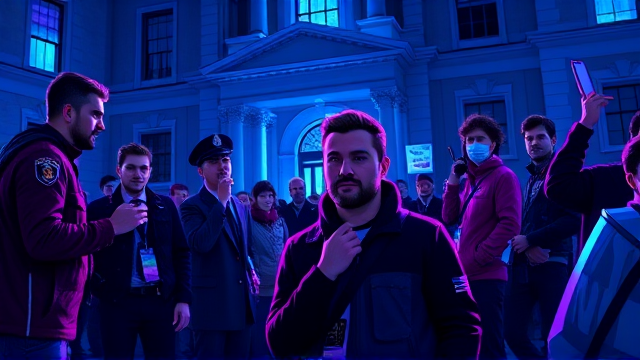Far-right activist Tommy Robinson appears in UK court
The political theater outside Westminster Magistrates' Court unfolded with predictable precision Monday morning, as far-right organizer Tommy Robinson—real name Stephen Yaxley-Lennon—arrived for his latest legal battle flanked by a handful of loyal supporters, a scene reminiscent of a campaign stop minus the crowds. This wasn't just another court date; it was a strategic maneuver in the ongoing media war between anti-establishment figures and state authorities, with Robinson pleading not guilty to charges under Section 49 of the Terrorism Act for refusing to divulge his telephone PIN to counterterrorism police back in 2024.The legal framework itself reads like a political operative's playbook: detainees can be held for up to six hours and are legally obliged to provide encryption keys or face prosecution, a power that critics argue blurs the line between legitimate security and overreach. Robinson's decision to withhold his PIN isn't merely a legal technicality—it's a calculated defiance, a rallying cry for his base that frames the state as an oppressive force, much like his orchestration of last month's massive far-right march through London, which drew thousands and dominated headlines.Behind the scenes, this case echoes historical tensions seen in other democracies where activist leaders leverage legal battles for visibility; think of how certain populist figures in Europe have turned courtrooms into platforms, galvanizing support by portraying themselves as martyrs. Polls show public opinion is sharply divided: some view Robinson's stance as a principled stand for privacy rights, while others see it as obstructionism that hampers national security efforts.Analysts note that the outcome could set a precedent for how Britain balances civil liberties against counterterrorism needs, especially as digital privacy becomes a frontline issue in political discourse. Robinson's trajectory—from football hooligan to influential agitator—mirrors a broader trend of anti-system movements gaining traction through savvy media manipulation and grassroots mobilization.His supporters, though fewer in number outside the courthouse, are fiercely dedicated, often amplifying his message on social media with hashtags and viral clips that frame the prosecution as a witch hunt. Meanwhile, government officials maintain that compliance with such requests is essential for disrupting potential threats, pointing to past cases where encrypted communications played a role in plotting attacks.The stakes are high: a conviction could weaken Robinson's movement, but an acquittal might embolden similar acts of resistance, reshaping the landscape of political dissent in the UK. As this legal drama plays out, it's clear that Robinson's court appearance is more than a procedural step—it's a battle in the war for narrative control, where every hearing, every statement, is a piece of campaign strategy designed to sway public sentiment and challenge institutional authority.
Latest News
In a decisive maneuver that sent immediate shockwaves through the geopolitical and technological landscape, the Dutch government has seized operational control
40 minutes ago0 comments
In a move that will be scrutinized by historians for its geopolitical weight, the United States President, alongside a cadre of world leaders, has formally
50 minutes ago2 comments
In a calculated diplomatic maneuver that speaks volumes through its silence, the Venezuelan government has shuttered its embassy in Oslo, a move coming just
55 minutes ago0 comments
In the grand theater of global diplomacy, where the specter of a trade war between the world's two preeminent economic powers looms large, the latest
1 hour ago0 comments
The meticulously choreographed exchange of prisoners and hostages between Israel and Palestine, while a tangible de-escalation, represents not an endpoint but
1 hour ago0 comments
Japan has initiated a comprehensive review of foreign-owned land sales, a strategic move driven by escalating national security apprehensions that analysts
1 hour ago0 comments
The political theater outside Westminster Magistrates' Court unfolded with predictable precision Monday morning, as far-right organizer Tommy Robinson—real
2 hours ago0 comments
In a move that echoes the gravest moments of the Cold War, Britain’s domestic intelligence service, MI5, has issued a stark and unusually public warning to the
3 hours ago2 comments
It’s quiet here...Start the conversation by leaving the first comment.
